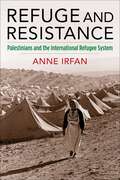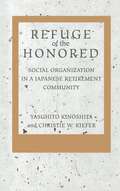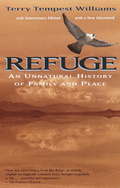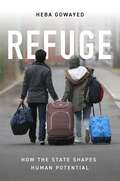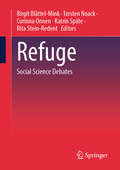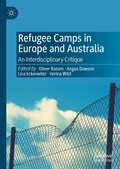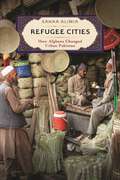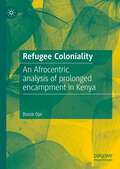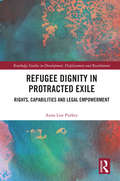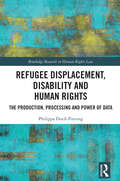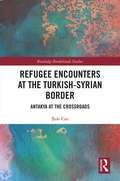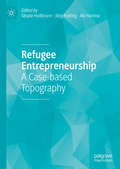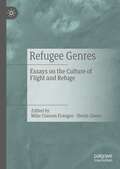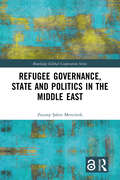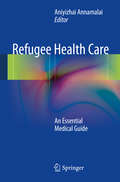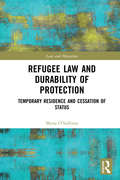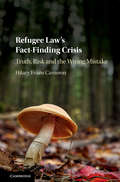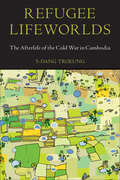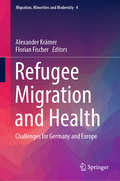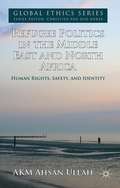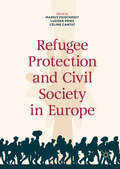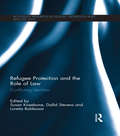- Table View
- List View
Refuge and Resistance: Palestinians and the International Refugee System (Columbia Studies in International and Global History)
by Anne IrfanIn the decades after World War II, the United Nations established a global refugee regime that became central to the lives of displaced people around the world. This regime has exerted particular authority over Palestinian refugees, who are served by a specialized UN body, the Relief and Works Agency (UNRWA). Formed shortly after the 1948 war, UNRWA continues to provide quasi-state services such as education and health care to Palestinian refugee communities in the Middle East today.This book is a groundbreaking international history of Palestinian refugee politics. Anne Irfan traces the history and politics of UNRWA’s interactions with Palestinian communities, particularly in the refugee camps where it functioned as a surrogate state. She shows how Palestinian refugees invoked internationalist norms to demand their political rights while resisting the UN’s categorization of their plight as an apolitical humanitarian issue. Refuge and Resistance foregrounds how nonelite activism shaped the Palestinian campaign for international recognition, showing that engagement with world politics was driven as much by the refugee grass roots as by the upper echelons of the Palestine Liberation Organization. It demonstrates that refugee groups are important actors in global politics, not simply aid recipients.Recasting modern Palestinian history through the lens of refugee camps and communities, Refuge and Resistance offers vital new perspectives for understanding politics beyond the nation-state.
Refuge of the Honored: Social Organization in a Japanese Retirement Community
by Yasuhito Kinoshita Christie W. KieferFaced with the decline of the traditional family and the explosive growth of the over-65 population, the Japanese are looking for new ways to care for their elders. This timely study documents the birth of a major social phenomenon in Japan—the planned retirement community.In the mid-1980s, Yasuhito Kinoshita spent a year living in Japan's first such community, Fuji-no-Sato. His collaboration with Christie W. Kiefer, a cultural gerontologist, is the first detailed study of a retirement community in a non-Western culture.Fuji-no-Sato is a social community with no visible traditions. Kinoshita and Kiefer show that its residents' preference for long-established relationships creates the need for the invention of relationships that have no precedent in Japanese society.This book reveals much about Japanese culture, and about the "graying of society" that plagues the newly industrialized countries of Asia. Its lessons about sensitivity to the elderly's values and the need for clear communication have important applications in other cultures as well.
Refuge: An Unnatural History of Family and Place
by Terry Tempest WilliamsIn the spring of 1983 Terry Tempest Williams learned that her mother was dying of cancer. That same season, The Great Salt Lake began to rise to record heights, threatening the herons, owls, and snowy egrets that Williams, a poet and naturalist, had come to gauge her life by. One event was nature at its most random, the other a by-product of rogue technology: Terry's mother, and Terry herself, had been exposed to the fallout of atomic bomb tests in the 1950s. As it interweaves these narratives of dying and accommodation, Refuge transforms tragedy into a document of renewal and spiritual grace, resulting in a work that has become a classic.From the Trade Paperback edition.
Refuge: How the State Shapes Human Potential
by Heba GowayedHow states deny the full potential of refugees as people and perpetuate social inequalityAs the world confronts the largest refugee crisis since World War II, wealthy countries are being called upon to open their doors to the displaced, with the assumption that this will restore their prospects for a bright future. Refuge follows Syrians who fled a brutal war in their homeland as they attempt to rebuild in countries of resettlement and asylum. Their experiences reveal that these destination countries are not saviors; they can deny newcomers’ potential by failing to recognize their abilities and invest in the tools they need to prosper.Heba Gowayed spent three years documenting the strikingly divergent journeys of Syrian families from similar economic and social backgrounds during their crucial first years of resettlement in the United States and Canada and asylum in Germany. All three countries offer a legal solution to displacement, while simultaneously minoritizing newcomers through policies that fail to recognize their histories, aspirations, and personhood. The United States stands out for its emphasis on “self-sufficiency” that integrates refugees into American poverty, which, by design, is populated by people of color and marked by stagnation. Gowayed argues that refugee human capital is less an attribute of newcomers than a product of the same racist welfare systems that have long shaped the contours of national belonging.Centering the human experience of displacement, Refuge shines needed light on how countries structure the potential of people, new arrivals or otherwise, within their borders.
Refuge: Social Science Debates
by Birgit Blättel-Mink Katrin Späte Torsten Noack Corinna Onnen Rita Stein-RedentThe welcome culture of 2015 in Germany has, not least due to the (re)definition of safe countries of origin, turned into a deportation policy. How can this change in policy be understood and is it also accompanied by a change of attitude among the population? Which reasons for and which reasons against the admission of refugees are cited in social debates? This volume brings together analyses of the social discourse on dealing with refugees, questions of labour market integration and the practice of counselling refugees. Alongside academic analyses are reflective contributions from the practice of migration policy.With contributions by Olaf Struck.- David Stiller.- Helge Döring and Sebastian Kurtenbach.- Ann-Christine Lill, Janis Schneider and Sam Schneider.- Kirsten Hoesch. - Kathrin Weis.- Theresa Köhler and Kerstin Ettl.- Doris Beer.- André Pohlmann.- Katharina Resch, Gertraud Kremsner, Michelle Proyer, Camilla Pellech, Regina Studener-Kuras and Gottfried Biewe.The editors: Prof. Dr. Birgit Blättel-Mink is Professor of Sociology with a focus on industrial and organizational sociology at the Goethe University in Frankfurt/Main. Torsten Noack, M.A. Sociology, Head of the School for Work Education of the International Federation Stuttgart. Prof. Dr. Corinna Onnen is university professor for general sociology at the University of Vechta. Dr. Katrin Späte works at the Institute for Sociology at the University of Münster. Apl. Prof. Dr. Rita Stein-Redent works at the University of Vechta.
Refugee Camps in Europe and Australia: An Interdisciplinary Critique
by Angus Dawson Oliver Razum Lisa Eckenwiler Verina WildThis Palgrave Pivot examines refugee camps in the EU, Australia, and their border zones. The approach is interdisciplinary, comprising perspectives of history, ethics, political science, literature, and health. The book argues that current practice of accommodating refugees is arbitrary and disempowering, ranging from strict regulation within nation states to detrimental conditions in extraterritorial camps. It instead proposes to increase public scrutiny of refugee camps, to enforce existing laws, and to endorse ethical place-making. With its contributions from a wide range of fields, this edited volume will be of interest to academics and students in public health, ethics, sociology, politics, and related fields.
Refugee Children: Towards the Next Horizon
by Charles WattersThe last twenty years have seen unprecedented numbers of refugee children entering Western countries. Many of these children will have experienced the atrocities of war and issues concerning their care and treatment are high on the agenda of research bodies, policy makers and service providers. Refugee Children is the first book to offer a wide ranging analysis of the context of care and the measures taken by nation states and intergovernmental bodies to address perceived problems. Drawing on a detailed examination of practices, the book outlines a model of good practice in the care of refugee children. Topics covered include: the treatment of asylum seeking children at the borders of industrialised countries reception, psycho-social problems, social capital, education, and issues relating to cultural diversity and integration a critical analysis of responses to these problems including the development of special programmes for refugee children, elements of good practice in the field the transfer of good practice between countries implications for the development of services and academic research in this vital area. With a series of case studies examining practices from a number of countries, Refugee Children makes a vital contribution both to the social care literature in this field and to theory and research in refugee and migration studies. As such it is essential reading for academic researchers in a range of disciplines including social policy, education, migration and refugee studies as well as service providers in health care, social care, housing and education. Charles Watters is Director of the European Centre for the Study of Migration and Social Care in the School of Social Policy, Sociology and Social Research at the University of Kent.
Refugee Cities: How Afghans Changed Urban Pakistan
by Dr. Sanaa AlimiaSituated between the 1970s Soviet Union’s invasion of Afghanistan and the post–2001 War on Terror, Refugee Cities tells the story of how global wars affect everyday life for Afghans who have been living as refugees in Pakistan. This book provides a necessary glimpse of what ordinary life looks like for a long-term refugee population, beyond the headlines of war, terror, or helpless suffering. It also increases our understanding of how cities—rather than the nation—are important sites of identity-making for people of migrant origins.In Refugee Cities, Sanaa Alimia reconstructs local microhistories to chronicle the lives of ordinary people living in low-income neighborhoods in Peshawar and Karachi and the ways in which they have transformed the cities of which they are a part. In Pakistan, formal citizenship is almost impossible for Afghans to access; despite this, Afghans have made new neighborhoods, expanded city boundaries, built cities through their labor in construction projects, and created new urban identities—and often they have done so alongside Pakistanis. Their struggles are a crucial, neglected dimension of Pakistan’s urban history. Yet given that the Afghan experience in Pakistan is profoundly shaped by geopolitics, the book also documents how, in the War-on-Terror era, many Afghans have been forced to leave Pakistan. This book, then, is also a documentation of the multiple displacements migrants are subject to and the increased normalization of deportation as a part of “refugee management.”
Refugee Coloniality: An Afrocentric analysis of prolonged encampment in Kenya
by Bosco OpiThis book presents a decolonial and Afrocentric critique of prolonged encampment of refugees, centred on the case study of refugee camps in Kenya, introduced through the author’s decades-long experience of forced displacement. His positionality as a former refugee contributes to a wider discussion on representation, voice, and power within the refugee studies literature. Likewise, the revisiting of the refugee camp as site and tool of power from a colonial perspective, is an important and timely contribution to the literature. This book examines the camp as a colonial innovation and the enduring colonial logics of supposedly ‘humanitarian’ extended encampment. Drawing on the anti-colonial theorists such as Fanon, Mbembe, and Nyerere, etc, it argues for an Africa without borders or encampment. The study is interdisciplinary, encompassing forced migration/refugee studies, camp studies, decolonial studies, and African studies. More broadly, it seeks to contribute to the literature on the politics of asylum in Africa through a critical examination of the colonial origins and the practice of encampment in Kenya.
Refugee Dignity in Protracted Exile: Rights, Capabilities and Legal Empowerment (Routledge Studies in Development, Displacement and Resettlement)
by Anna Lise PurkeyThis book investigates how effective human rights and the inherent dignity of refugees can be secured in situations of protracted exile and encampment. The book deploys an innovative human rights-based capabilities approach to address fundamental questions relating to law, power, governance, responsibility, and accountability in refugee camps. Adopting an original theoretical framework, the author demonstrates that legal empowerment can change the distribution of power in a given refugee situation, facilitating the exercise of individual agency and assisting in the reform of the opportunity structure available to the individual. Thus, by helping to increase the capability of refugees to participate actively in the decisions that most affect their core rights and interests, participatory approaches to legal empowerment can also assist in securing other capabilities, ultimately ensuring that refugees are able to live dignified lives while in protracted exile. Ultimately, the book demonstrates that legal empowerment of refugees can bring lasting benefits in establishing trust between refugees, the state, and local communities. It will be of interest to researchers within the fields of refugee studies, international law, development studies, and political science, as well as to policy-makers and practitioners working in the fields of refugee assistance and humanitarian intervention.
Refugee Displacement, Disability and Human Rights: The Production, Processing and Power of Data (Routledge Research in Human Rights Law)
by Philippa Duell-PieningThis book presents a timely and innovative exploration of one of the first human rights articles about data production and processing: the Convention on the Rights of Persons with Disabilities article 31, ‘Statistics and data collection’.The study provides detailed explorations of the legal and practical demands of article 31, how these have been interpreted and the practice of human rights research with marginalised communities. It describes the history of the article’s drafting in detail, uncovering the tensions at its heart today. This analysis provides the foundations for an alternative doctrinal reading of the obligations in article 31 and an exploration of a potential group right. The book's detailed analysis is assisted by a new conceptual framework that illustrates the relationship between visibility and power. The work demonstrates that data is not inert but powerful and may be used in ways that are helpful and harmful to rights holders. Through closely examining disability human rights data practices in refugee contexts, it concludes that human rights protections are being ignored in the urgency to create more data to identify and address inequality. The author identifies immediate actions that may be taken to remediate current practices.The book will be an invaluable resource for academics, researchers and policy-makers working in disability studies, human rights law, refugee and migration studies, technology and society.
Refugee Encounters at the Turkish-Syrian Border: Antakya at the Crossroads (Routledge Borderlands Studies)
by Şule CanThe Turkish-Syrian borderlands host almost half of the Syrian refugees, with an estimated 1.5 million people arriving in the area following the outbreak of the Syrian civil war. This book investigates the ongoing negotiations of ethnicity, religion and state at the border, as refugees struggle to settle and to navigate their encounters with the Turkish state and with different sectarian groups. In particular, the book explores the situation in Antakya, the site of the ancient city of Antioch, the "cradle of civilizations", and now populated by diverse populations of Arab Alawites, Christians and Sunni-Turks. The book demonstrates that urban refugee encounters at the margins of the state reveal larger concerns that encompass state practices and regional politics. Overall, the book shows how and why displacement in the Middle East is intertwined with negotiations of identity, politics and state. Faced with an environment of everyday oppression, refugees negotiate their own urban space and "refugee" status, challenging, resisting and sometimes confirming sectarian boundaries. This book’s detailed analysis will be of interest to anthropologists, geographers, sociologists, historians, and Middle Eastern studies scholars who are working on questions of displacement, cultural boundaries and the politics of civil war in border regions.
Refugee Entrepreneurship: A Case Based Topography
by Sibylle Heilbrunn Jörg Freiling Aki HarimaThrough a global series of case studies, this pioneering book delves into refugee entrepreneurship - a major economic, political and social issue emerging as a top priority. Stories from Australia, Germany, Pakistan and many other countries, highlight the obstacles facing refugees as they try to integrate and set up businesses in their new countries. Engaging contributions set the stage for a cross-analysis of the particularities and limitations faced by refugee entrepreneurs, culminating in an extended discussion about the future implications of refugee entrepreneurship for theory, policy and practice. This interdisciplinary book explores the motivations and drivers of refugee entrepreneurship, making it an insightful read not only for those engaged in entrepreneurship, but also for those interested in migration studies from a variety of academic disciplines.
Refugee Genres: Essays on the Culture of Flight and Refuge
by Mike Classon Frangos Sheila GhoseThis volume brings together research on the forms, genres, media and histories of refugee migration. Chapters come from a range of disciplines and interdisciplinary approaches, including literature, film studies, performance studies and postcolonial studies. The goal is to bring together chapters that use the perspectives of the arts and humanities to study representations of refugee migration. The chapters of the anthology are organized around specific forms and genres: life-writing and memoir, the graphic novel, theater and music, film and documentary, coming-of-age stories, street literature, and the literary novel.
Refugee Governance, State and Politics in the Middle East (ISSN)
by Zeynep Şahin MencütekThe movement of displaced people, migrants and refugees has become increasingly important around the world, leading to a need for increased scrutiny of global responses and policies towards migration. This book focuses on the Middle East, where many nations are part of this global phenomenon as both home, transit and/or host country.Refugee Governance, State and Politics in the Middle East examines the patterns of legal, political and institutional responses to large-scale Syrian forced migration. It analyses the motivations behind neighbouring countries' policy responses, how their responses change over time and how they have an impact on regional and global cooperation. Looking in particular at Turkey, Lebanon and Jordan, three of the world's top refugee hosting countries, this book explores how refugee governance differs across countries and why they diverge. To theorize variations, the book introduces multi-pattern and multi-stage refugee governance models as two complementary analytical frameworks. The book further argues that each of these three states’ refugee responses is constructed based on three main factors: internal political interests, economic-development related concerns, and foreign policy objectives as well as interactions among them. The book’s categorizations and models (on policy fields, actors, stages, patterns and driving forces) provide analytical tools to researchers for comparative analyses.Scholars and students of Comparative Politics, International Relations, Refugee Studies, Global Governance and Middle Eastern Studies will find this book a useful contribution to their fields.The Open Access version of this book, available at http://www.taylorfrancis.com, has been made available under a Creative Commons Attribution-Non Commercial-No Derivatives (CC-BY-ND) 4.0 license.
Refugee Health Care
by Aniyizhai AnnamalaiRefugees arrive in the United States from different parts of the world and their numbers increase every year. Refugees undergo a medical screening soon after arrival, as recommended by the U. S. Department of State, and it is often primary care practitioners or psychiatrists who usually evaluate these patients at this first visit. Though physicians receive a variable amount of training in cross-cultural medicine, virtually none is in the area of refugee evaluations. Refugee evaluations are different from routine patient evaluations in several significant ways: 1) They are new immigrants from countries where the disease epidemiology is different from the U. S. ; 2) Certain infectious disease processes need to be ruled out upon arrival to prevent the spread of communicable diseases; 3) The prevalence of mental health disorders in refugees is higher than the local population; 4) The medical and psychiatric health problems of refugees are often caused or affected by their past experience with trauma and their current acculturation difficulties; and 5) Significant cultural barriers can arise in the accurate evaluation and treatment of these refugees. Books on refugee health usually are written from ecological and public health perspectives and address generic refugee population issues. There are very few clinical textbooks, and most focus only on mental health. Refugee Health Care is a practical guide providing focused information for busy primary care practitioners, and many of the recommendations in the book apply to all immigrants. This concise pocketbook reviews medical and psychiatric conditions that are essential to know in the evaluation and treatment of refugees.
Refugee Law and Durability of Protection: Temporary Residence and Cessation of Status (Law and Migration)
by Maria O’SullivanThis book examines the link between refugee protection, duration of risk and residency rights. It focuses on two main issues of importance to current state practice: the use of temporary forms of refugee status and residency and the legal criteria for cessation of refugee status under Article 1C(5) of the 1951 Refugee Convention. In analysing this issue, this book canvasses debates which are pertinent to many other contentious areas of refugee law, including the relationship between the refugee definition and complementary protection, application of the Refugee Convention in situations of armed conflict, and the role of non-state bodies as actors of protection. It also illustrates some of the central problems with the way in which the 1951 Refugee Convention is implemented domestically in key asylum host states. The arguments put forward in this book have particular significance for the return of asylum seekers and refugees to situations of ongoing conflict and post-conflict situations and is therefore highly pertinent to the future development of international refugee law.
Refugee Law and Policy: A Comparative and International Approach 2nd edition
by Karen Musalo Jennifer M. Moore Richard A. BoswellThis book provides a thoughtful scholarly analysis of refugee and asylum law, with enhanced comparative, international, and historical legal perspectives.
Refugee Law’s Fact-Finding Crisis: Truth, Risk, And The Wrong Mistake
by Hilary Evans CameronAt a time when many around the world are fleeing their homes, seeking refugee protection has become a game of chance. Partly to blame is the law that governs how refugee status decision-makers resolve their doubts. This long-neglected branch of refugee law has been growing in the dark, with little guidance from the Refugee Convention and little attention from scholars.<P><P> By looking closely at the Canadian jurisprudence, Hilary Evans Cameron provides the first full account of what this law is trying to accomplish in a refugee hearing. She demonstrates how a hole in the law's normative foundations is contributing to the dysfunction of one of the world's most respected refugee determination systems, and may well be undermining refugee protection across the globe. The author uses her findings to propose a new legal model of refugee status decision-making.<P> Provides a new way of understanding how the law of fact-finding in refugee status decision-making operates, and why it is malfunctioning.<P> Undertakes an extremely thorough review of fact-finding judgments in the refugee law context within one national jurisdiction.<P> Initiates an important conversation in the international refugee law community, pushing us to rethink how refugee status decision-making should operate.<P>
Refugee Lifeworlds: The Afterlife of the Cold War in Cambodia (Asian American History & Cultu)
by Y-Dang TroeungCambodian history is Cold War history, asserts Y-Dang Troeung in Refugee Lifeworlds. Constructing a genealogy of the afterlife of the Cold War in Cambodia, Troeung mines historical archives and family anecdotes to illuminate the refugee experience, and the enduring impact of war, genocide, and displacement in the lives of Cambodian people. Troeung, a child of refugees herself, employs a method of autotheory that melds critical theory, autobiography, and textual analysis to examine the work of contemporary artists, filmmakers, and authors. She references a proverb about the Cambodian kapok tree that speaks to the silences, persecutions, and modes of resistance enacted during the Cambodian Genocide, and highlights various literary texts, artworks, and films that seek to document and preserve Cambodian histories nearly extinguished by the Khmer Rouge regime. Addressing the various artistic responses to prisons and camps, issues of trauma, disability, and aphasia, as well as racism and decolonialism, Refugee Lifeworlds repositions Cambodia within the broader transpacific formation of the Cold War. In doing so, Troeung reframes questions of international complicity and responsibility in ways that implicate us all.
Refugee Lifeworlds: The Afterlife of the Cold War in Cambodia (Asian American History & Cultu)
by Y-Dang TroeungCambodian history is Cold War history, asserts Y-Dang Troeung in Refugee Lifeworlds. Constructing a genealogy of the afterlife of the Cold War in Cambodia, Troeung mines historical archives and family anecdotes to illuminate the refugee experience, and the enduring impact of war, genocide, and displacement in the lives of Cambodian people. Troeung, a child of refugees herself, employs a method of autotheory that melds critical theory, autobiography, and textual analysis to examine the work of contemporary artists, filmmakers, and authors. She references a proverb about the Cambodian kapok tree that speaks to the silences, persecutions, and modes of resistance enacted during the Cambodian Genocide, and highlights various literary texts, artworks, and films that seek to document and preserve Cambodian histories nearly extinguished by the Khmer Rouge regime. Addressing the various artistic responses to prisons and camps, issues of trauma, disability, and aphasia, as well as racism and decolonialism, Refugee Lifeworlds repositions Cambodia within the broader transpacific formation of the Cold War. In doing so, Troeung reframes questions of international complicity and responsibility in ways that implicate us all.
Refugee Migration and Health: Challenges For Germany And Europe (Migration, Minorities And Modernity Ser. #4)
by Alexander Krämer Florian FischerThis book focuses on the closely interlinked areas of refugee migration and health. It discusses the main challenges of the recent unprecedented, extremely diverse and mostly unregulated refugee migration wave for Germany and Europe, and offers a broader view of refugee health from a European perspective. Health issues can lead to several challenges for refugees as well as healthcare providers, and as such the book also examines the requirements for the management of migrant populations in terms of medical care and health system adaptations, and includes theoretical aspects of refugee migration and health as well as various perspectives on the latest developments. Lastly, it describes the healthcare system demands and responses for short- and long-term care of refugees.
Refugee Politics in the Middle East and North Africa
by Akm Ahsan UllahAKM Ahsan Ullah provides an insightful analysis of migration and displacement in the Middle East and North Africa. He examines the intricate relationship of these phenomena with human rights, safety concerns, and issues of identity crisis and identity formation. Engaging in a wide range of current debates including the Arab Uprising and regional and international responses to refugee movements, this book will enrich the present understanding of migration and refugee rights.
Refugee Protection and Civil Society in Europe
by Ludger Pries Margit Feischmidt Celine CantatThis volume analyses civil society as an important factor in the European refugee regime. Based on empirical research, the chapters explore different aspects, structures and forms of civil society engagement during and after 2015. Various institutional, collective and individual activities are examined in order to better understand the related processes of refugees’ movements, reception and integration. Several chapters also explore the historical development of the relationship between a range of actors involved in solidarity movements and care relationships with refugees across different member states. Through the combined analysis of macro-level state and European policies, meso-level organization's activities and micro-level individual behaviour, Refugee Protection and Civil Society in Europe presents a comprehensive exploration of the refugee regime in motion, and will be of interest to scholars and students researching migration, social movements, European institutions and social work.
Refugee Protection and the Role of Law: Conflicting Identities (Routledge Research in Asylum, Migration and Refugee Law)
by Susan Kneebone Loretta Baldassar Dallal StevensSixty years on from the signing of the Refugee Convention, forced migration and refugee movements continue to raise global concerns for hosting states and regions, for countries of origin, for humanitarian organisations on the ground, and, of course, for the refugee. This edited volume is framed around two themes which go to the core of contemporary ‘refugeehood’: protection and identity. It analyses how the issue of refugee identity is shaped by and responds to the legal regime of refugee protection in contemporary times. The book investigates the premise that there is a narrowing of protection space in many countries and many highly visible incidents of refoulement. It argues that ‘Protection’, which is a core focus of the Refugee Convention, appears to be under threat, as there are many gaps and inconsistencies in practice. Contributors to the volume, who include Erika Feller, Elspeth Guild, Hélène Lambert and Roger Zetter, look at the relevant issues from the perspective of a number of different disciplines including law, politics, sociology, and anthropology. The chapters examine the link between identity and protection as a basis for understanding how the Refugee Convention has been and is being applied in policy and practice. The situation in a number of jurisdictions and regions in Europe, North America, South East Asia, Africa and the Middle East is explored in order to ask the question does jurisprudence under the Refugee Convention need better coordination and how successful is oversight of the Convention?
